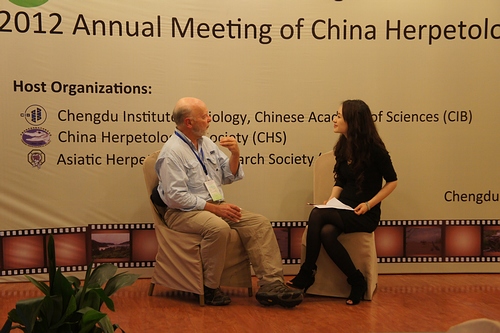

Interview 1 Video website: http://vod.cas.cn/vod_cib_cas/CIBV/201206/t20120606_3593123.html
Interviewer: Zhu Dan
Interviewee: Professor Richard Shine
Interviewer: Welcome to our program! Really, it is very nice to meet you. You have a very high reputation in the herpetological fields of the world. I feel really honored to have the chance to interview with you. So, what do you think of the significance of this conference?
Shine: It’s really exciting stuff. China is changing so quickly, and this is my fourth trip to China, and I’ve seen incredible changes. And here we have a conference full of young people with energy, with new ideas, with new methods, finding out exciting things. Now, it is wonderful to be here. It is very stimulating for us.
Interviewer: Oh, as you know, you always stay in Australia, but the scientists here are always in China. How do you contact with each other –how do you know them? Through the conference—or by the publications?
Shine: Well, I think first through the publications-- but for example, there was a book on Shidao, an island full of snakes in China. I contacted Professor Zhou Ermi through the [Chinese] Academy, and he put me in contact with the people who worked on the island, so I came across, and I did some trips where I did some studies over there, so I met many Chinese scholars. And then, a Chinese scholar, Professor Wei Guodu, came to my laboratory and spent four years, and so now he’s a very good friend. It is very pleasant for my wife and I to come back and visit with Guodu…And of course, we meet with his students and his colleagues. It just keeps going.
Interviewer: Oh, so like friends’ friends!
Shine: Yeah!
Interviewer: So you are all friends…As friends, you carry out the cooperation, maybe.
Shine: The world is very small—
Interviewer: Oh yeah, by internet—
Shine: Yes, through the internet, with email. Yes, you can collaborate very effectively with people from other countries.
Interviewer: So another question is, how can you evaluate the herpetological research in China and in Asia?
Shine: I mean…It’s a difficult field to evaluate because it’s changing so quickly.
Interviewer: You are a prominent scientist! You have the right to judge other persons--
Shine: Well no, the quality is very high, and it is increasing rapidly. And Chinese people are seizing the new opportunities, the new methods, the new ideas. So the talks that I’m hearing, I think they’re very similar in many ways to the talks I would be hearing in herpetological conferences in the USA or in Australia. Really, you have smart young people asking interesting questions about interesting animals, and you have that same feeling of enthusiasm。
Interviewer: Now just in this conference, I have seen so many young scholars from all over the world. I chat with a Chinese young scholar each day…but I can’t figure out the difference between them. Do you think there is a difference between them?
Shine: Difference between who?
Interviewer: Between the international scholars …maybe between the Australian scholars and the Chinese scholars.
Shine: Well, I think the motivations are similar, the approaches are similar. There are different cultural backgrounds. People ask questions in slightly different ways; there are probably issues that are more important in one country than another, depending on the different kinds of animals they have, the kinds of cultural and environmental issues that influence the way you ask those questions. But I am struck much more by the similarities than by the differences.
Interviewer: So, my last question is, how to judge the young persons in this field now? Compared with the scientists from when you were their age?
Richard Shine: The young people today are doing much better science than I was doing when I was their age. I think I had very little idea of many of these much more sophisticated questions. I hope it’s partly because the field has improved and not that I’m just more stupid than they are. I think the work is very high quality. For so long, the reptiles and amphibians of China, we knew so little about in the west. There was so little detail, scientific information –and the same is true for similar parts of the world. And suddenly, that’s changing. Suddenly, the scientific journals are full of papers by Chinese scholars telling us about the biology of these animals. We’ve heard some incredible stories about the way that the music frog changes its call and advertises to the female that it’s got a good burrow to lay her eggs in. I mean, extraordinary pieces of biology.
Interviewer: So, things have changed very quickly. So at your age at that time, you used fewer technologies.
Shine: Yes, absolutely!
Interviewer: So now we have more advanced technologies, we use more tools. We can do better than before.
Shine: It’s partly the new technology, that’s important, but it’s also the creative thinking. It’s very hard to pin down, but it’s equally important in doing good science. And I think it’s really exciting that the young Chinese scholars are reading the theoretical papers, and they’re interested in the ideas and the questions, they’re thinking about hypotheses and how to test them. They’re really doing some very, very good science.
Interviewer: Maybe they are our bright future.
Shine: I think so.
Interviewer: Thank you, and I hope that you will be able to come a second time, a third time, so many times. This was our interview, and we truly feel honored to invite Richard。You are always welcome in Chengdu.